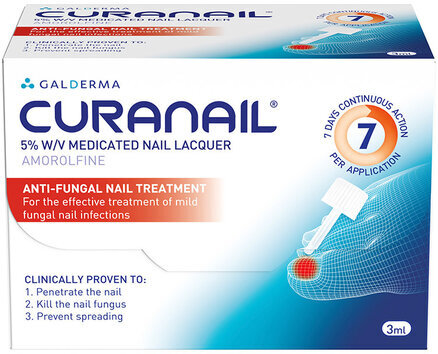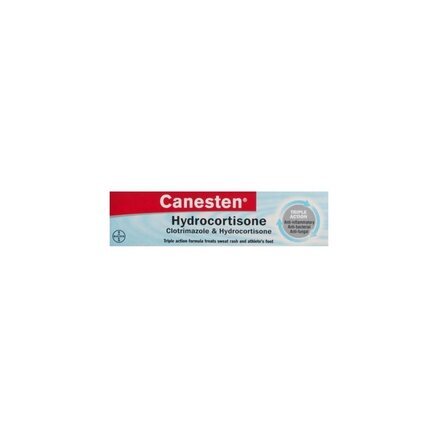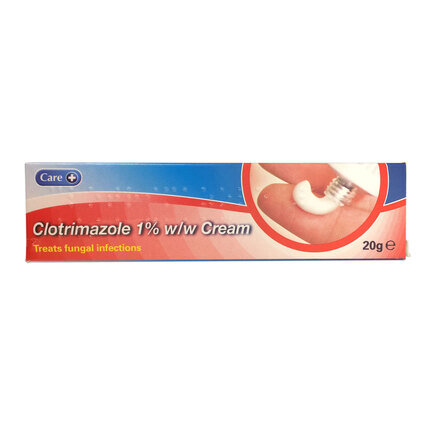Refine your search
Fungal Infections
Curanail 5% Fungal Nail Treatment... In stock
From £16.99Clotrimazole 1% Antifungal... In stock
From £2.53
Overview
Fungal infections can be stubborn and uncomfortable, but you can regain your health and confidence with the right treatment. At Pharmacy Online, we offer a range of expertly formulated antifungal treatments to help you tackle infections effectively. Whether you're dealing with athlete’s foot, ringworm, or yeast infections, our products provide fast relief and long-lasting results.
Our selection includes powerful creams like Clotrimazole Cream 1% and Canesten Hydrocortisone and Curanail 5% to relieve symptoms and clear infections.
Understanding fungal infections
Fungal infections, also known as mycoses, are caused by various types of fungi that thrive in warm, moist environments. These infections can affect different parts of the body, including the skin, nails, and mucous membranes.
While they're generally not life-threatening, they can cause significant discomfort and lead to more serious health issues if left untreated.
Why prompt treatment of fungal skin infections is key
Treating fungal infections quickly is essential for several reasons.
1. Secondly, addressing the infection quickly reduces discomfort and potential complications, such as secondary bacterial infections.
2. Firstly, early treatment can prevent the infection from spreading to other parts of your body or to other people.
3. Lastly, prompt treatment helps to ensure a shorter and more effective treatment period, preventing the infection from becoming chronic or more resistant to treatment.
Types of Fungal Infections
Fungal infections come in various forms and can affect different parts of the body, each presenting its own unique set of symptoms and challenges. Understanding the common types of fungal infections can help you identify and treat them promptly, ensuring faster relief and recovery:
Athlete’s Foot (Tinea Pedis)
Athlete’s foot affects up to 15% of the population at any given time. This common infection, characterised by itching, burning, and cracked skin, thrives in warm, damp environments like locker rooms and public showers.
Our over-the-counter solutions, such as Clotrimazole Cream and Terbinafine creams, provide effective relief. For more severe cases, our prescription treatments ensure comprehensive care, helping you get back on your feet quickly.
Ringworm (Tinea Corporis)
Despite its name, ringworm isn’t caused by a worm but by a fungus. This infection, which can appear anywhere on the body, manifests as a red, ring-shaped rash.
Our antifungal creams and oral medications are designed to effectively treat ringworm, stopping the infection in its tracks and preventing it from spreading.
Nail Fungus (Onychomycosis)
Nail fungus, or onychomycosis, affects millions of people globally. It causes nails to become discoloured, thickened, and brittle.
Our advanced treatments, including medicated nail lacquers, penetrate deep into the nail bed to eradicate the infection.
Studies show that up to 10% of the adult population has nail fungus, and Curanail 5% Fungal Nail Treatment can help you achieve clearer, healthier nails.
Yeast Infections (Candidiasis)
Yeast infections, often caused by the Candida fungus, can be particularly uncomfortable, leading to symptoms like redness, itching, and discharge.
At Pharmacy Online, we offer top-tier treatments such as Fluconazole and Canesten, which provides quick relief and help restore your comfort and well-being. Miconazole oral gel can also be used for oral thrush in babies.
Nearly 75% of women will experience a yeast infection at some point in their lives, and our solutions ensure you get effective and discreet care when you need it most.
Causes of a Fungal Skin Infection
Fungal infections are caused by various types of fungi. The most common fungi responsible for these infections are:
Dermatophytes: Dermatophytes are a group of fungi that thrive on keratin, the protein found in your skin, hair, and nails. They're the primary cause of infections like athlete's foot, ringworm, and jock itch. These fungi can spread through direct contact with infected individuals, animals, or contaminated surfaces.
Candida: Candida is a type of yeast that naturally lives on the skin and inside the body. While it usually exists harmlessly, certain conditions can cause it to overgrow, leading to infections such as oral thrush and vaginal yeast infections. Factors like a weakened immune system or antibiotic use can disrupt the natural balance of Candida, resulting in an infection.
Symptoms of Fungal Skin Infections
Fungal infections can manifest in various ways depending on their type and severity. Recognising the symptoms early can help you seek appropriate treatment and prevent the infection from spreading.
Superficial infections
Superficial fungal infections affect the outer layers of the skin, nails, and mucous membranes.
Common symptoms include:
Peeling, broken skin: The affected broken skin may start to peel, often leading to discomfort and further irritation.
Redness: Inflamed areas of skin that may appear red and irritated (skin rash).
Itching: Persistent itchiness that can range from mild to severe.
Discoloured nails: Fungal infections of the nails, known as onychomycosis, often result in yellow, brown, or white discolouration, along with thickening and brittleness of the nails.
These symptoms are typically seen in conditions like athlete’s foot, ringworm, and candidiasis, and they require timely treatment to avoid spreading and worsening.
Deep infections
Deep or systemic fungal infections can affect internal organs and tissues, often posing more serious health risks. These infections are usually seen in individuals with weakened immune systems.
Common symptoms include:
Chest pain: Discomfort or pain in the chest, which may be a sign of lung involvement.
Cough: Persistent coughing that may produce blood or mucus, commonly seen in lung infections like aspergillosis.
Fever: Raised body temperature, indicating an ongoing infection.
Headaches: Severe headaches that can indicate a fungal infection in the brain or central nervous system.
Deep fungal infections, such as histoplasmosis, coccidioidomycosis, and cryptococcosis, often require more intensive medical treatment and monitoring.
Diagnosing a Fungal Infection
Accurate, early diagnosis facilitates quicker recovery. Early and precise identification can help your doctor or pharmacist decide the right treatment plan, ensuring faster recovery and preventing complications.
A few ways to diagnose fungal infections include:
Biopsies: In cases where the diagnosis is uncertain or if the infection is more severe, a biopsy may be performed. This involves taking a small tissue sample from the affected area and examining it in a laboratory. Biopsies can provide more detailed information about the infection and help rule out other conditions.
Visual examination: The first step in diagnosing a fungal infection often involves a visual inspection of the affected area by a healthcare professional. This includes looking at the skin, nails, or other visible symptoms to identify characteristic signs of fungal infections, such as redness, scaling, and discolouration.
Lab tests: Lab tests are typically the next step if a visual examination indicates a possible fungal infection. A sample of the affected area (such as skin scrapings, nail clippings, or swabs) is collected and examined under a microscope. These tests can identify fungal elements and determine the specific type of fungus causing the infection.
Imaging tests: For deep or systemic fungal infections that affect internal organs, imaging tests such as X-rays, CT scans, or MRIs may be used.
Antifungal Medicine
Fungal infections can be effectively treated with a range of antifungal medications.
Over-the-counter (OTC) treatments
OTC treatments are often sufficient for treating mild fungal infections. These medications are readily available, easy to use, and quickly relieve symptoms.
OTC antifungal products come in various forms, each designed to treat specific infections.
Common treatments include:
Terbinafine: Often used for athlete's foot and ringworm, Terbinafine is available in creams and sprays.
Clotrimazole Cream: Effective for treating athlete's foot, jock itch, and ringworm. Available as a cream from Pharmacy Online, Clotrimazole works by disrupting the cell membrane of the fungus, leading to its death.
Miconazole: This drug is useful for a range of fungal infections, including athlete's foot and yeast infections.
Prescription treatments
Prescription medications may be necessary for more severe or persistent fungal infections. These treatments are typically stronger and require a doctor's approval.
Oral antifungals
Oral medications are often prescribed for extensive infections or those that do not respond to topical treatments.
Topical prescriptions for persistent infections
Strong topical medications may be prescribed for infections that are resistant to OTC treatments. These are formulated to penetrate deeper into the skin or nail bed, ensuring more effective treatment.
Laser treatments
If nail lacquer doesn't work, your doctor might recommend laser therapy as an innovative treatment for nail fungus. It involves using focused light to penetrate the nail and destroy the fungus, providing an alternative for those who do not respond well to traditional treatments.
Combining treatments for severe cases
In some instances, combining different antifungal treatments can enhance effectiveness. This approach may involve using both topical and oral medications to ensure comprehensive eradication of the infection.
When to see a doctor
If your symptoms persist or worsen despite using over-the-counter treatments, it's time to consult a doctor. Symptoms such as intense itching, redness, and discomfort that do not improve with initial treatment may indicate a more severe infection or resistance to standard medications. A healthcare professional can provide a more accurate diagnosis and prescribe stronger medications if necessary.
If you experience recurring fungal infections despite adhering to treatment plans, it's essential to see a doctor. Recurrent infections can indicate underlying health issues such as diabetes, immune system disorders, or environmental factors that must be addressed.
Take Control of Your Health
At Pharmacy Online, we understand the importance of addressing fungal infections promptly and effectively. Our range of antifungal treatments is curated to offer the best solutions, whether you need OTC products for mild infections or prescription medications for more severe cases. We provide discreet, fast, and reliable service, ensuring you receive the care you need with complete privacy.








